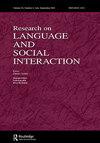偏好与极性:问题设计中的认识立场
IF 2.1
1区 文学
Q1 COMMUNICATION
引用次数: 25
摘要
摘要:本文研究了负极化在极性(是/否)问题中的应用。它认为,问题极性是用来对问题中提及的事态的概率或非概率采取一种认识立场,采取这种立场实际上是不可避免的。针对负极性问题(NPQs),本文引证了四种主要证据,表明NPQs与提问者认为问题的基本命题不可能存在的立场有关:(a)自我修复以逆转或以其他方式调整极性;(b)引起问题的先前谈话的证据;(c)与某一特定事态有关但尚未说明的情况;(d)谈话的整体结构组织特征(例如,谈话结束)不利于肯定回应的可能性。最后,本文提出,问题设计相对于-à-vis行为的偏好-组织特征代表了一个独特的组织层,并且通过与信息寻求问题相比,它似乎以不同的方式与招聘和从属关系相关的问题(例如,请求,要约等)有关。数据来源于英式英语和美式英语会话的语料库。本文章由计算机程序翻译,如有差异,请以英文原文为准。
Preference and Polarity: Epistemic Stance in Question Design
ABSTRACT This article considers the use of negative polarization in polar (yes/no) questions. It argues that question polarity is used to take an epistemic stance toward the probability or improbability of the state of affairs referenced in the question and that taking such a stance is effectively unavoidable. Focusing on negatively polarized questions (NPQs), four main kinds of evidence are adduced that NPQs are associated with the questioner’s stance that the question’s underlying proposition is unlikely: (a) self-repair to reverse or otherwise adjust polarity; (b) evidence from the prior talk from which the question is occasioned; (c) contexts in which a particular state of affairs is relevant but has remained unstated; (d) overall structural organizational features of talk (e.g., conversational closings) that militate against the likelihood of affirmative responses. Finally, the article proposes that question design represents a distinct organizational layer vis-à-vis the preference-organizational characteristics of actions, and it appears to function in distinctive ways in relation to recruitment- and affiliation-relevant questions (e.g., requests, offers, etc.) by comparison with information-seeking questions. Data are drawn from corpora of British and American English conversations.
求助全文
通过发布文献求助,成功后即可免费获取论文全文。
去求助
来源期刊
CiteScore
7.30
自引率
7.40%
发文量
20
期刊介绍:
The journal publishes the highest quality empirical and theoretical research bearing on language as it is used in interaction. Researchers in communication, discourse analysis, conversation analysis, linguistic anthropology and ethnography are likely to be the most active contributors, but we welcome submission of articles from the broad range of interaction researchers. Published papers will normally involve the close analysis of naturally-occurring interaction. The journal is also open to theoretical essays, and to quantitative studies where these are tied closely to the results of naturalistic observation.

 求助内容:
求助内容: 应助结果提醒方式:
应助结果提醒方式:


